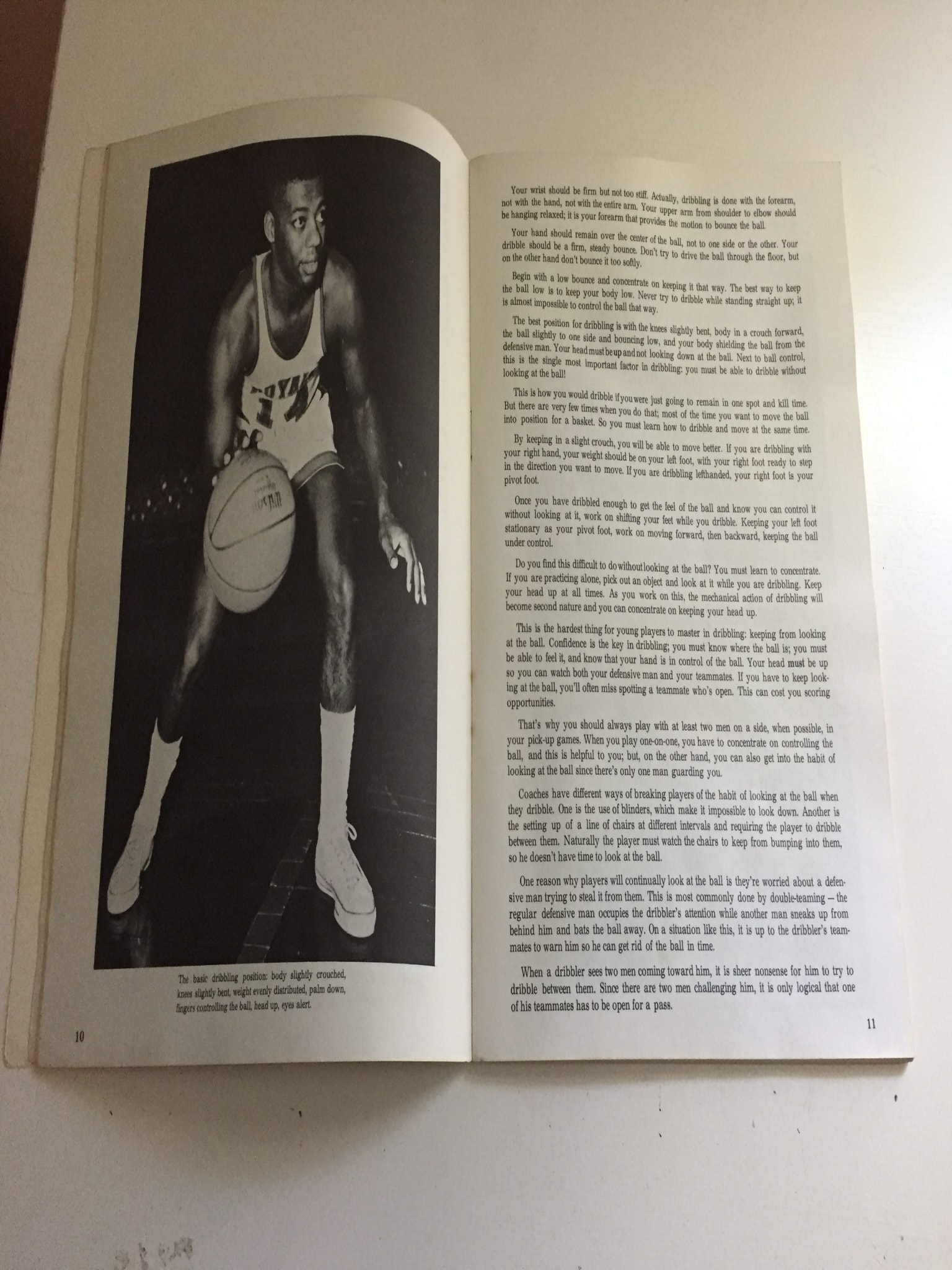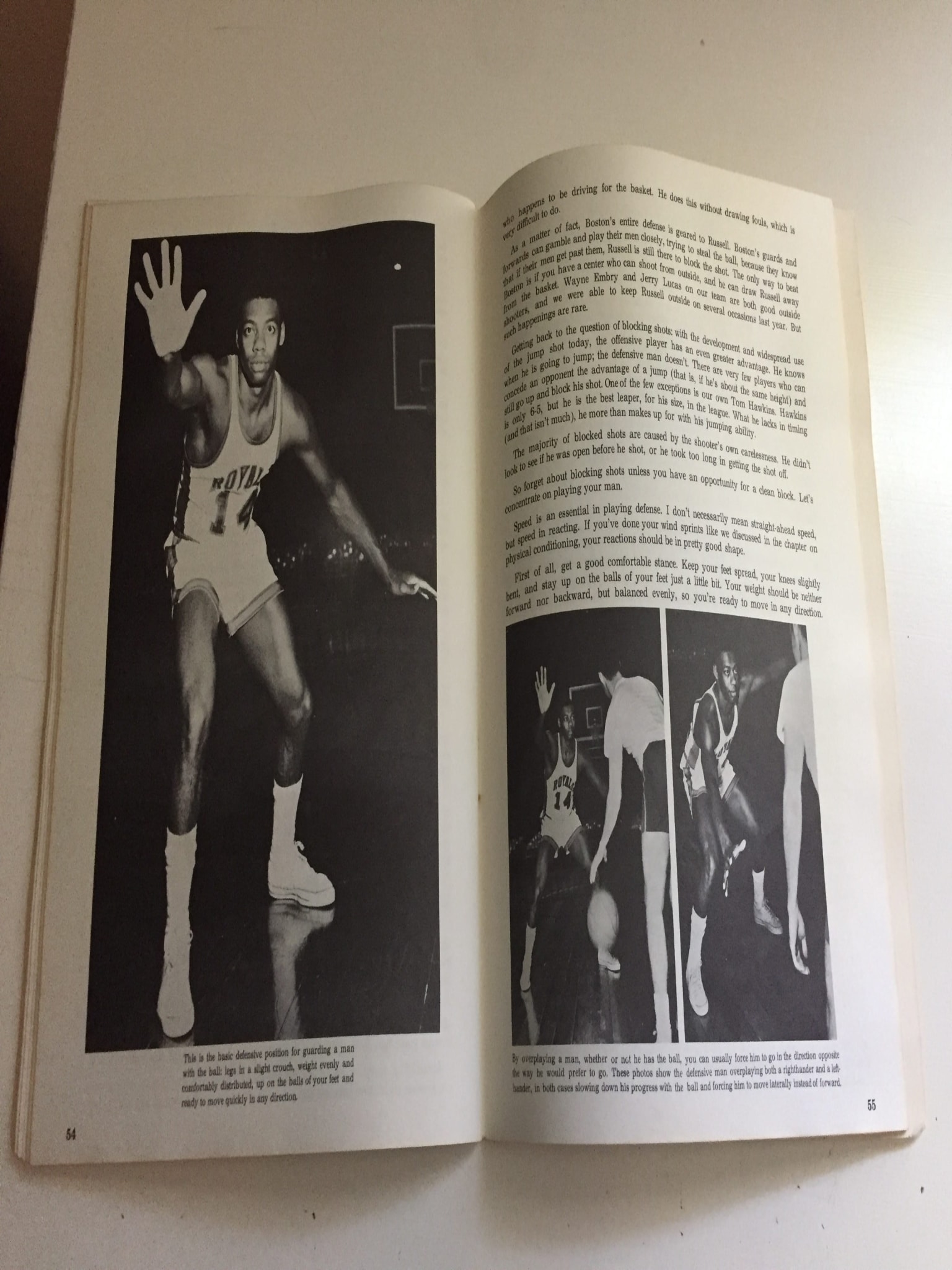There aren’t many people I’d rather ask how to play basketball better than Oscar Robertson.
In 1964, Robertson published a book answering that exact question, and I found it in a box in my childhood room while going through some old stuff this weekend.
This 63-page book breaks down how to successfully and efficiently improve in all aspects of basketball, from the basics of physical conditioning and dribbling to the multiple ways to handle a screen while defending. It’s mostly text, with the pages double the size of my outstretched hand, with photos of Oscar Robertson, and others when necessary, displaying various skills and actions to help make you a better basketball player.
Before finding this book in my room, I did not know it existed, let alone that I owned a copy. I have no idea how I got this. I was not alive in 1964. My parents were barely alive in 1964. But somehow it found its way into a box in my bedroom.

At the start of the book, Oscar Robertson wrote a forward explaining what a reader can expect to get out of it.
“This book has been written with only one purpose in mind: to help you become a better basketball player,” it reads. “I feel that if you will apply the principles explained and, where possible, illustrated in this book, you cannot help but show improvement in the fundamentals of basketball.
“Nothing sharpens your skill like competition. But everyone can’t always take part in organized competition. The beauty of basketball is that you can develop your skills on your own. All you need is a goal, a basketball, some room to operate, and the willingness to practice on your own to become a better basketball player.
“Practice – even if you must do it alone – need not be a drudgery. If you set a goal for yourself and work toward it, you can take pride in your improvement each day. And even if you never become a star player, or never even go out for organized competition, you will have the satisfaction of knowing that you accomplished something by yourself.
“Fundamentals – dribbling, passing, shooting, rebounding, and defense – are the heart of basketball. Some coaches – and most basketball books, for that matter – tend to take fundamentals for granted. Since this will probably always be the case, it is up to you as an individual to master the fundamentals on your own. This book can help you do it.
“Since this is my first book, naturally I’m interested in finding out whether it helps you. If you make progress, let me know. Or if you have any questions on the material contained in this book, I’ll try to answer them. You can write me in care of the Cincinnati Royals, 2250 Seymour Avenue, Cincinnati, Ohio 45212.
“Good luck!”
As interesting as this little piece of the book is, perhaps the most striking to me is the suggestion that some coaches and instructors don’t value teaching fundamentals enough, and that it will likely always be that way. This was in 1964. This has been a common criticism of how basketball works in this country now and for the last several years, and it makes me wonder if this has been a complaint for as long as basketball has had a relatively large platform.

Not only is this a piece of history, it has direct instruction on how to improve from one of the greatest to ever pick up a basketball. The information in this book is valuable, both from a basketball-focused perspective and some of the larger messages within it.
This book doesn’t just tell you how to get better at hoops, it motivates you, too. For example, Oscar Robertson says on page three that the first step to becoming a good basketball player is proper physical conditioning, and he goes on to explain its importance regardless of who you are.
“You may ask yourself, ‘Why should I bother to get in shape? All I ever do is play in my back yard, or a few pick-up games here and there.’
“My answer is, if you’re going to do anything, do it right. If you’re going to play basketball at all, play it the best way you can. This means being in shape.
“In the first place, you should have enough pride in yourself to be in good physical condition anyway, whether or not you ever take part in athletics. If you keep yourself strong and healthy, you’ll have less chance of catching cold or childhood diseases. It takes will power and a bit of self-denial here and there, but it’s well worth it, believe me.”

On page seven, Oscar Robertson took out some space to create a excerpt just on confidence and its crucial role.
“Confidence is not a basketball fundamental. It is, however, a basketball necessity, just as it is necessary in any other sport.
“Confidence is the difference between a rookie player in the National Basketball Association stepping right into the lineup and helping his team, or riding the bench and learning the tricks of the trade the slow, painful way.
“With the exception of a few standout players, almost every college player comes into the league with about the same fundamental skills. It is the confident players – the men who believe in themselves, who take charge and show leadership – who make the team. The ones who are hesitant and unsure of themselves are cut loose, even though they may be as good as or better than the other players.
“You have to believe in yourself before anybody else will. So, even if you don’t feel that you’re quite as good as the players you’re facing, don’t let them know it. Confidence is gained through competition, but you must practice on your own to sharpen your skills so you’ll be ready when the time for competition comes.
“That’s why the subject of confidence is brought up here, before I go into any of the fundamental aspects of the game of basketball. Our purpose from here on in will be not only to develop your skills in these fundamentals, but your confidence in these skills as well.
“If you follow the physical conditioning program I have outlined, you will take the first step toward gaining confidence in yourself. Why? Because you will prove to yourself that you can do these things, many of which you may have thought you could not do.
“Now apply the same determination to the rest of the principles in this book. Develop your skills and your confidence at the same time!”
This feels like a special basketball relic that I apparently own, and I wanted to share it. Now that I have it, I want to read the whole thing carefully. I’m sure there’s plenty of basketball knowledge and general wisdom to be gained from it, and I’m excited to learn from a young Oscar Robertson!
This article was originally published Aug. 31, 2020.







